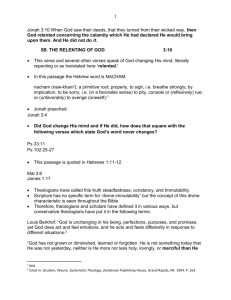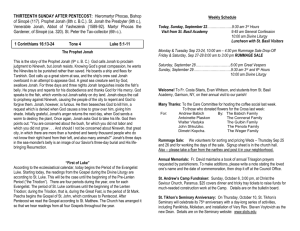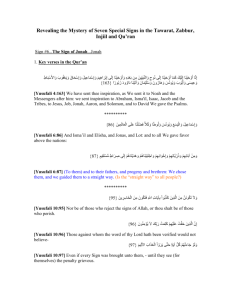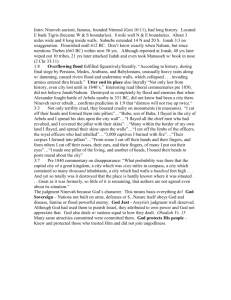Paul Finger 2561463 Due Date: Friday, 2nd November 2007 Course
advertisement
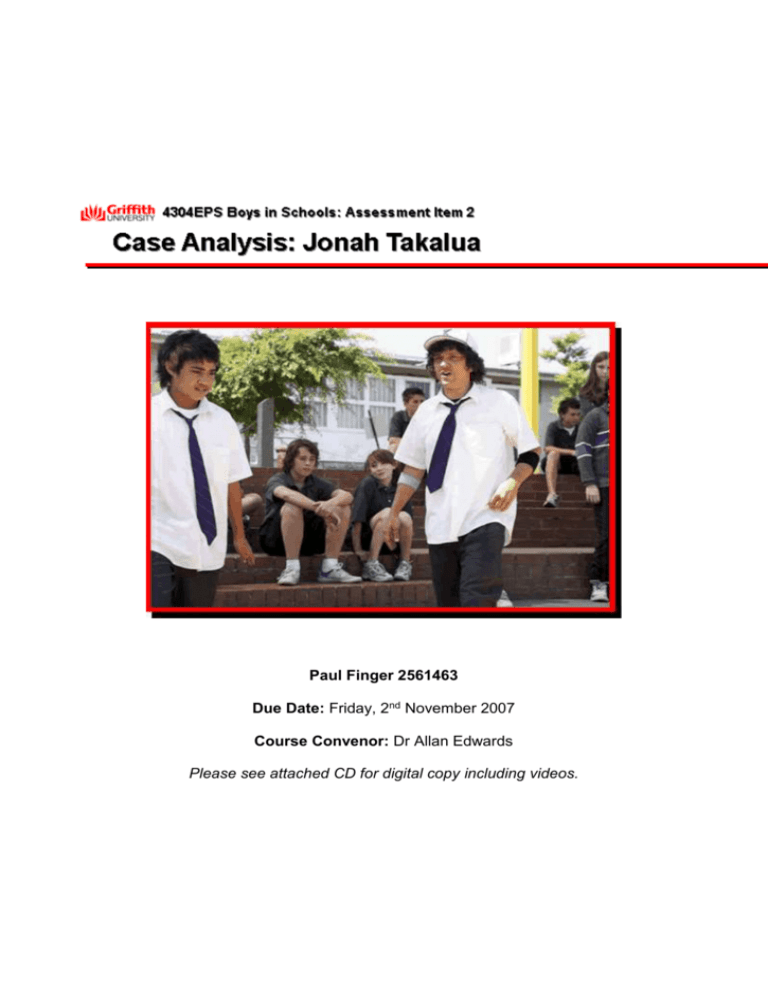
Paul Finger 2561463 Due Date: Friday, 2nd November 2007 Course Convenor: Dr Allan Edwards Please see attached CD for digital copy including videos. This case analysis is based on a fictional character known as Jonah Takalua. The character was seen on a television program known as Summer Heights High which reflects many of the contemporary issues associated with schooling today. In some respects the show looks through a humorous lens; however the issues are still real, and the student at hand could very well be a student similar to ones in the school system to today. This document will be sectioned into several parts: Context and Scenario: The context and scenario will provide links to videos of Jonah Takalua, and interviews with various members of staff. Student Profile: The student profile will look at the history of the student, including schooling and family. It will identify the interests of Jonah Takalua; and provide a theoretical look at the character in terms of his reflection of theory associated with the social construction of masculinity, manhood and boyhood as a platform for understanding the nature of his behaviour. Incident Analysis: The incident analysis will deconstruct one behavioural incident that occurred during the time observing Jonah, through the framework of Antecedent (A), Behaviour (B), Consequence (C) and Setting Events (S). This is followed by a critical reflection on the observed practice, and how a modification of the Consequences and Antecedents could promote an improved support system for the behaviour. Intervention Strategies: The intervention strategies section will look at the different attempts the school has made to support Jonah Takalua, how he has responded to these; and attempt to theorise why the results were such. Relationships with teachers: The relationships with teachers section identifies Jonah's relationship with three different members of staff at Summer Heights High and looks at how these relationships have effected his attitudes toward schooling and his behaviour. Behaviour Intervention Plan: The behaviour intervention plan is a simulated plan that could be implemented for Jonah Takalua based on the evidence collected. While hypothetical in nature, the process is representative of a real world application. Paul Finger 2561463 - 4304EPS Boys in Schools: Assessment Item 2 - Page 2 - Name: Jonah Takalua School: Summer Heights High Age: 13 Year: 8 Identified Behavioural Issues: Bullying Aggression Defacement of School Property – tagging. Language Background Information: Area: Details: Family Born in Tonga Single parent family - father is a large fellow who displays similar qualities as Jonah. Lost mother at an early age. Socio-Economic Low socio-economic area. Medical Issues with ADHD. Been on and off the Ritalin for a sustained period of time. Engagement with Displays issues with literacy and numeracy. schooling Known to go long periods of time without submitting work. Previous schooling Expelled from two previous schools: One for setting fire to a student's locker. The other for defacing the Principal's car. Student Interests: Area Details Social Groups Belongs to a social group of fellow Polynesian students known as Poly Force. They are also known as the FOB's for Fresh off the Boat. Jonah believes the expectation of this group is to be tough and places a heavy emphasis on how strong and 'tough' they are. Break Dancing Considers break dancing as one of his more enjoyable pass times. Dedicates most of his outside classroom hours to it. He gets very competitive about this aspect of his life. Television Jonah has an interest in television shows such as MTV's Punked. On some occasions he has been known to replicate the acts made on these shows, which he has perceived as being acceptable behaviour. Role Models Role models include 50 cent, who Jonah uses as a status symbol when suggesting that he has met this person. A theoretical look at Jonah Takalua: Paul Finger 2561463 - 4304EPS Boys in Schools: Assessment Item 2 - Page 3 - Jonah Takalua exhibits many of the attributes that some theoretical perspectives would typically attribute to being masculine and in the process of developing into a young man. These include the innate yearning for recognition from maternal figures; the desire to belong in social groups and familiar crowds; and the use of physical pressure to assert his authority in these groups. Unfortunately, the loss of his mother at an early age severed the link with his primary maternal link. Biddulph (1997) suggests that in the early years of existence, all boys are mummy's boys. This idea is founded on the premise that boys have an emotional link to the nurturing figure in their life that brought them into the world. A similar dimension of this is the way in which a male will use the early years of puberty as a time to develop skills generally associated with communicating with and seeking acknowledgement from the opposite sex. In some instances, the feminine figure can come in the form of a female teacher. For Jonah Takalua, the only female figures he is exposed to are those he encounters in a schooling environment. This quest for belonging leads into the desire to belong. Not unlike all people, Jonah Takalua seeks belonging, which is enhanced by the absence of his mother. Maslow (1987) describes belonging as one of the fundamental social and emotional needs of human beings. Jonah finds this belonging in his social groups and by relating to common interests and practices as those in his social groups. While some could perceive the Polynesian group as a dysfunctional group of boys in the school, Gurian and Stevens (2007) would suggest that the school is simply not equipped to cater for the needs of these boys. In their eyes, many of the practices such as bullying and inappropriate language are considered normal practice, and the teachers do not understand this. Such an argument raises the issue of what would be considered natural boy habits of play, and socially inappropriate actions. As far as Jonah and his peers are concerned, their actions are appropriate and the students and teachers simply cannot recognise this. A prime example of this is the use of his physical presence to represent an idea of being 'tough'. Jonah repeatedly discusses the way in which the Islander boys are considered tougher than anyone else. Weinstein, Smith, and Wiesenthal (1995) describe this as the method in which some boys define their masculinity. Specifically, the use of physical strength allows the young man to assert his superiority among the group. Social status is closely linked to this, which leads directly into the social capital associated with break dancing (Ball, 2003). As one of the more popular pass times within the social circles of students in this context, Jonah has endeavoured to become superior to others in this aspect also. Ultimately, due to issues potentially associated with literacy and numeracy or inability to engage with schooling, Jonah has looked to other methods, ones he is mirroring from parental figures and peers to gain acknowledgement and belonging. This case analysis will look to break down the cause of these behaviours and devise a plan of attack to improve the life chances of Jonah Takalua. Paul Finger 2561463 - 4304EPS Boys in Schools: Assessment Item 2 - Page 4 - The following incident analysis deconstructs an incident involving Jonah through the perspective of the ABC + S of positive behavioural support. Once the incident is pull apart, a critical lens is used to identify how the consequences and antecedents can be adjusted to improve the behaviour in future, or to minimise the severity of the behaviours at hand. ABC + S Analysis of Incident: Setting Events: In prior lessons, Jonah has experienced conflict with Miss Wheatley. On more than one occasion Jonah has found himself in Time Out, or lost property for fiddling. It is believed by Miss Wheatley that Jonah has no intention to learn. Jonah is also on a behaviour contract with Mr Peterson that Jonah signed stating that he will respect other students and teachers. Prior to this lesson, Jonah and his friends 'Punked' Miss Wheatley in the car park. Intentions aside, Miss Wheatley took great offence to the incident. In this lesson, the expectation of students was to sit quietly doing their work. Antecedent: Upon arrival: "Look it's the Islander boys who are late again" Teacher asks Jonah to do work quietly. Behaviour: Jonah is fiddling with equipment. Disrupting the student next to him. Consequence: Teacher uses verbal reprimand to inform Jonah that it is not appropriate to use that langauge in class. Jonah 'baits' the teacher with comments about what she is Teacher refers to wearing. behavioural contract. Jonah refers to section of Escalated back and forward contract about 'respecting' word fight teachers but misconstrues the issue. "Jonah, cap off, balls on the ground, now thank you." Jonah stands up and sits on the ground claiming that he is putting his balls on the Mr Peterson arrives requesting two strong boys. ground. Jonah is not selected. Jonah swears at Mr Peterson. Teacher has no response to Jonah's calling out. Teacher attempts to physically carry him. Mr Peterson informs Jonah that he has broken his contract and will spend the rest of the lesson at Miss Murray's (Principal) office. Learned Behaviour: Gain: Positive attention from peers when acting out. Jonah has learned that if he baits the Paul Finger 2561463 - 4304EPS Boys in Schools: Assessment Item 2 - Page 5 - teacher and receives a response from the teacher, his peers will laugh. For Jonah, this satisfies his needs for attention. Get out of: Work. Due to Jonah's issues with literacy and numeracy, it is difficult for him to engage with an English lesson. Therefore, Jonah understands that if he creates a battle with the teacher the result with be that he avoids the work. Critical Analysis: Behavioural Support Strategies used effectively: Giving reference to the behaviour contract was used effectively; however this would have been an opportune time to offer Jonah a choice (Rogers, 2004). Behavioural Support Strategies not used effectively or omitted: When the students arrived late, the teacher allowed Jonah and his friends to dominate the lesson. Other technics that could have been used include giving subtle gestures to get the message across and stating that they will follow up the issue later. Immediately, this disrupted the environment Miss Wheatley was attempting to create in the classroom. What the teacher failed to see in this instance was that in a way Jonah was giving her a compliment about her outfit. If the teacher recognised this as a compliment or at least 'taken' it as one, Jonah could have received the attention he desired and the issue may not have escalated (Colvin, 2004). Another strategy that could have been used was introducing Mr Peterson as a support for Miss Wheatley. At first glance it appeared that he arrived in the class to help Miss Wheatley control the situation. However, Mr Peterson should have allowed Jonah to 'help out' as a method of removing him from the class without giving Jonah the satisfaction of pressing the teacher's buttons. Essentially, this entire situation required a great deal of debriefing after the incident that did not occur. Decreasing the Influence of Setting Events: Social skills training: a system should be set up to allow Jonah and his friends to learn the appropriateness of contextual humour. The car park issue should be resolved prior to the next class, and ongoing issues should not be carried into the classroom. Re-design the nature of the lesson to cater for different students that are unable to engage with the work. Modifciations to Antecedents: Desired Behaviour: Modifications to Consequence: Upon arrival: "Look it's the Islander boys who are late again" Jonah is fiddling with Teacher uses verbal equipment. Disrupting the reprimand to inform student next to him. Jonah that it is not appropriate to use that langauge in class. Remove the attention away Structure opportunities to from the students. Never allow students to 'fiddle with label them as anything. equipment'. Set specific times Asking Jonah what the Paul Finger 2561463 - 4304EPS Boys in Schools: Assessment Item 2 - Page 6 - Jonah's ambition was to allow the students in his class to let them know that he and his friends had 'Punked' Miss Wheatley. The teacher could move toward the students and give soft toned instructions of what is expected. in which this occurs. In this case, the premise is not on the behaviour being inappropriate in general, but inappropriate at certain times. Jonah 'baits' the teacher with comments about what she is wearing. Teacher asks Jonah to do work quietly. Jonah respects the teacher as per his contract. Structure a way for Jonah to use communication Jonah refers to the section effectively such as of contract about designing a task that 'respecting' teachers but requires critical chat about misconstrues the issue. an issue so Jonah has his opportunity to speak. Jonah does not look at Escalated back and forward word fight. Essentially, this was due to escalate from the beginning. The earlier this is nipped in the bud the better, but by this point the focus should be on offering Jonah a choice with desirable outcomes for the teacher rather than verbal reprimand. "Jonah, cap off, balls on the ground, now thank you." scoring points against the teacher. Jonah stands up and sits on the ground claiming that he is putting his balls on the ground. expectations of the class are and referring him to the nature of his contract could work much better than simply telling him what is appropriate. By asking him, he states the expectations himself. Choices can also be used if the situation appears to be escalating. Teacher refers to behavioural contract. Could have asked Jonah what the consequences of either abiding by or breaking the contract and give a reminder to what Jonah would prefer. Teacher has no response to Jonah's calling out. Issue a choice, "continue calling out or you will be Ideally, Jonah would have the expected to..." Make the consequence relavant to understanding to know that the situation and the this behaviour is not inappropriate behaviour. appropriate in context, but Or alternately, "if you stop much work is required to calling out..." and state a reach this point. positive consequence. Jonah swears at Mr Peterson. Jonah uses appropriate This was more so an language to communicate his opportunity for Jonah than feelings. Again, this would an instruction, rephrasing require a great deal of work. the statement can remove 'you are asking for it' factor involved with such a statement. Mr Peterson arrives requesting two strong boys. Jonah is not selected. By not selecting Jonah, this undermined the opinion Jonah has of himself as being strong. Utilise this in future by structuring statements about being Paul Finger 2561463 - 4304EPS Boys in Schools: Assessment Item 2 Teacher attempts to physically carry him. This is a situation where the relationship with the student is important. If the situation escalates to this point, the teacher can acknowledge that the action is in fact humorous, but not appropriate and redirect Jonah to return to work. Mr Peterson informs Jonah that he has broken his contract and will spend the rest of the lesson at Miss Murray's (Principal) office. - Page 7 - 'tough' into the work at hand. Paul Finger 2561463 - 4304EPS Boys in Schools: Assessment Item 2 Ensure that he takes work with him so that he does not avoid the work. - Page 8 - The following intervention strategies were implemented by the school. Of each of these, only one had any positive effects on the student. This section critically analyses the intervention strategies and attempt to pin point where the strategies failed. Strategy 1: Behavioural Contract Premise: Jonah works with Doug Peterson to develop a behaviour contract that he signs. It is supported by Glasser's (1999) belief that the student then owns their own behaviour. By Jonah creating the rules himself, when he breaks the rules, he is letting himself down. Conditions of Contract: Jonah is to respect teachers and peers. Result of the Program: Jonah fails to respect Miss Wheatley which means he has broken his contract. Critical Analysis: The primary cause of failure with this strategy was that Jonah did not fully appreciate the implications of him breaking the contract. As seen from another example (further down), Jonah is not well equipped with the skills of understanding the responsibilities associated with owning your own behaviour. The second key downfall was that the contract was not used to support the student by examining ways of removing the function of the behaviour, rather it simply attempted to control his behaviour (Ryan, Halsey & Matthews, 2003). Such a program requires a holistic approach from all teaching staff to continually reinforce the nature of the contract and the implications of the contract, but more importantly to acknowledge Jonah when he is making progress with his contract (Rogers, 2004). In the cases observed, the contract was used as a threat rather than an encouragement to promote better behaviour. Strategy 2: Polynesian Pathways Premise: Doug Peterson established the Polynesian pathways as an intervention strategy to divert the Polynesian students at the school from unemployment, crime and drug abuse. The focus was on giving students opportunities to express themselves in ways that they prefer or what Dewey (1938) suggests is student-centred learning using the natural curiosity of the learner as a platform for curriculum (such as popular music and dance). Similar efforts were made through allowing the Polynesian students to explore and celebrate their culture. As a basis for this was the inclusion of Polynesian figures from the community to act as role models and guest speakers to encourage students to 'get back on track'. Included in this program was the inclusion of Poly day, where the students were expected to perform a traditional cultural dance in front of the school, and Jonah was permitted to write a short rap. Result of the Program: Students reluctantly participated in the Poly day dances. The year 7 students saw this as an opportunity to ridicule the Polynesian students. Critical Analysis: Paul Finger 2561463 - 4304EPS Boys in Schools: Assessment Item 2 - Page 9 - In some aspects, this program had many positive effects on the students as it allowed Jonah to participate in educational activities with his peers. While good for social development, some of the objectives of the intervention program missed the mark. The first is that the process of accessing students' interests is dependent on understanding the interests of the students, rather than predicting the students' interests (Hunter & Park, 2005). The feedback given to the program was generally negative. The second is that rather than becoming a celebration day, the cultural dance became an opportunity for other students to commit racism against the Islander boys. Again, this comes down to a holistic school approach to create an environment within the school to respect other students and their culture. Strategy 3: Year 7 Buddies Premise: Doug Peterson assigned each of the Year 8 Polynesian boys to a year 7 student to improve their understanding of responsibility. Going hand in hand with this intervention was an incentive scheme that suggested if the Polynesians do this appropriately they will be permitted to do break dancing on Poly day rather than the traditional dance. The notion here is that by offering the students something they want, gives them a reason to act appropriately. Result of the Program: The Islander boys abused the power they had by ordering the Year 7 buddies around. In an attempt to gain the incentive on offer they were reduced to pretending to care about the Year 7 buddies. Critical Analysis: While the premise was well intended, the sincerity on the part of the Year 8 boys was not there. Essentially, the only motivation for helping the Year 7 buddies was to gain something, rather than to genuinely help the students. The issue is that Jonah and his mates were focussed primarily on how the rest of the school would perceive them. In their eyes, doing something good for the Year 7 buddies would decrease their status as the 'tough kids' and remove the social capital they have built. Strategy 4: Gumnut Cottage Premise: Gumnut cottage is a remedial class established to help students having difficulty with literacy and numeracy to have intensive support to improve these skills. The teacher, Miss Palmer utilises a range of pedagogical methods to cater for the diverse needs of the students (Department of Education, Training and the Arts, 2004). Result of the Program: Students gained a genuine enthusiasm to learn. Jonah found a passion for reading. Critical Analysis: The most important influence on the success of this program was the attitude and genuine interest in the students displayed by Miss Palmer. The focus was on building the relationship with the students as a platform for accessing their worlds and introducing to them the importance and joy of learning. Rather than expecting the boys to engage with the current construction of schooling, the teacher redesigned the classroom so it could be more accessible to the students at hand (Gurian & Stevens, 2007). Paul Finger 2561463 - 4304EPS Boys in Schools: Assessment Item 2 - Page 10 - Jonah had strong relationships, either positive or negative with three particular members of the Summer Heights High teaching team. In each case a different relationship was formed based on the opinion each teacher had on the student. A very clear relationship is also recognised between improved behaviour and attitudes toward schooling; and the rapport a teacher forms with the student. Relationship with Miss Wheatley: After analysis, the relationship with Miss Wheatley would be considered poor. Stemming from Jonah's inability to engage with the literacy side of year 8 English, he was forced to devised new strategies for gain recognition from the maternal figure. Unfortunately, after a series of unfortunate confrontations between the teacher and Jonah Takalua, Miss Wheatley developed a negative view of the Year 8 student. As a result, Jonah needed to develop other techniques for gaining positive attention in this particular class. Through learned behaviour, Jonah discovered that acting like a clown and insulting the teacher would gain positive praise from peers through the form of laughter (Ryan, Halsey, & Matthews, 2003). From this point it becomes a race to the bottom as both Jonah and the teacher continually feud and the primary issue of literacy problems goes completely unrecognised. Relationship with Mr Peterson: The relationship with Mr Peterson is mid way between that of the one with Miss Wheatley and the one with Miss Palmer. Mr Peterson's apparent issues with Jonah sit more firmly with Ghandi's (1944) belief of 'hate the sin, love the sinner'. He understands that Jonah is an interesting child, but becomes frustrated because he has difficulty relating to where Jonah is coming from and the motivation behind Jonah's actions. Relationship with Miss Palmer: Miss Palmer represents a superior approach to developing a rapport with the students. She displays a genuine interest in her students and this mutual respect serves as the foundation of the work she is doing with the students (Keddie & Churchill, 2005). Another key element of this relationship is knowing what to expect from Jonah and understanding when the use of language or an insult is used out of compassion or out of spite. Similarly, she uses the respect she has developed to reinforce what is not acceptable and making small changes rather than attempting to correct his behaviour in one quick hit. Evidence of this comes in the form of slowly correcting Jonah with regards to high intensity low frequency behaviours such as language and name calling that generally gains him attention. Paul Finger 2561463 - 4304EPS Boys in Schools: Assessment Item 2 - Page 11 - Name: Jonah Takalua Age: 13 Year: 8 School: Summer Heights High Associated Family: Rocky Takalua Associated Staff: Miss Murray (Principal), Mr Peterson (Student Welfare), Miss Wheatley (English), Miss Palmer (Remedial English), Mr Gregson (Director of Performing Arts). Core Issues: Academic: Behavioural: Literacy and Numeracy: Social Skills: Many of Jonah's issues with behaviour stem from his inability to engage with school due to literacy and numeracy issues. His inability to complete the work in Year 8 English forces him to look for other methods of gaining attention in this context. As a result, he has learned that being a class fool gives him the attention from his peers, and allows him to avoid the work. Some of the core issues associated with his behaviour outside of a classroom stem from issues with social skills. Due to losing his mother at an early age and not having a caring figure in his father, Jonah seeks acceptance from teachers and students at Summer Heights High. His physical aggression is used as a method to gain social status within his social groups and the perception of being 'tough' is valued. His extremely high levels of inappropriate Many of the reasons that previous strategies language use is also attributed to by this have failed is that Jonah has perceived some issue as he lacks the ability to of the alternatives to his behaviours as being communicate his feelings appropriately 'homo', or less tough than what he would usually do. and this is mirrored by his father's communication skills. Defacement of school property is also used as social capital within the social groups. It stems from a motivation to leave his mark in the school and the lack of effective outlets to express himself through artistic methods. Previous Interventions : Successful: Unsuccessful: Gumnut Cottage Behavioural Contract Polynesian Pathways Year 7 Buddies Paul Finger 2561463 - 4304EPS Boys in Schools: Assessment Item 2 - Page 12 - Intervention Goals: Goals Immediate Term: Academic: Behavioural: - Improve Communication Skills including - Redefinition of 'tough'. Jonah is to work with the idea of being tough in different ways. - Remedial English to Improve Literacy continue: Decrease amounts of Jonah will continue to attend - Jonah decreases intensity aggressive remedial English and will be of disrupting class. behaviour. required to take work associated with other subject areas with him. - Jonah to become more 'mentally tough' when dealing with academic issues. Encourage him to attempt the work rather than looking for ways to avoid him. Medium Term: Create links between learning and behaviour Increase social capital in other fields -Improve Literacy and Numeracy - focussing specifically on the improvement of reading and writing to remove the issues associated with English class. The long term goal is that Jonah becomes 'tough at school' by consistently participating in class and completing all required work, which removes the need for work avoidance techniques. Long Term: - Jonah looks at appropriate behaviour in context by examining role models and media influences such as 'Punked'. - Jonah establishes appropriate methods of dealing with situations. These methods are written into his contract. The long term goal is that Jonah does not disrupt in class and uses other outlets to gain positive attention and generate 'entertainment'. Intervention Programs: Program Details and Goals: Evaluation Methods: Behavioural Contract: Using the reasons for the failure of the original behaviour contract as a basis, this contract will be created with Jonah focussing on two or three key areas at any one point. The objective will be to provide Jonah with positive and negative consequences. Monitor frequency associated with Jonah complying with and breaking the terms of his contract. Gumnut Cottage: The Gumnut Cottage program with Miss Palmer will continue. Currently, the areas that have been done well include the slow progression to improve reading skills; as well as the opportunities for Jonah to express himself through drawing. Listen to anecdotal feedback from Miss Palmer and Jonah Takalua to identify the progress he is making and look for links that can be made between this program and other programs. Polynesian Reconstruction of "Polynesian Monitor attendance of the Paul Finger 2561463 - 4304EPS Boys in Schools: Assessment Item 2 - Page 13 - Pathways: Pathways": Polynesian Pathways will be reconstructed into 'Poly Force'. The objective of this program is to use the foundations of their already established social group and reconstruct this into a healthy social group. It relates to Chris Sarra's (2003) work with Indigenous students in northern Queensland. The objective is to Polynesian students. Listen to anecdotal feedback from teachers and students about the positive and negative elements of the program. Specific Goals: Academic Opportunities: Offer opportunities for them to identify what makes being Polynesian great from their perspective specifically with respect to break dancing and being 'tough'. Deconstruction of being 'tough'. Look at ways of being 'tough'. 'Tough' at school, mentally tough, academically tough, and tap into their natural competitiveness to encourage them to engage with learning. Utilise their abilities with the Arts to create Poly Force songs, mottos, logos and dances. Scaffold a mission statement that suggests what it means to be Poly Force and how Poly Force is going to change the world. Build in a number of celebration days. Year 8 English: Working with Miss Wheatley, Jonah will be encouraged to complete assessment on topics that he negotiates with the teacher. By allowing Jonah to select topics, it removes his lack of motivation toward the topic. Teachers will structure opportunities for him to complete it on something of interest to him. Performing Arts: Working with Mr Gregson, Jonah and other students will be moved into a Dance and Drama stream. Paul Finger 2561463 - 4304EPS Boys in Schools: Assessment Item 2 Monitor attendance of each of the programs and compare this to the topics being addressed. Create adjustments to the nature of the program and see what works well for the students. Elements that work well should be encouraged further. Listen to anecdotal feedback from teachers and students about the positive and negative elements of the program. - Page 14 - This provides these students to gain the desired attention in a positive environment. It also serves as an outlet for the creativity of the students with regards to music and dance as well as permitting the celebration of Jonah's entertainment skills. Design of well structured, positive outlets for aggression including Sporting Programs: contact sports where Jonah acknowledges Social Skills Training: This program will look at the interests and role models of the students and allow them to critically examine each of them. Specifically it can allow the likes of Jonah to look at role models such as 50 Cent and examine what attributes Jonah aspires to in these and explore what socially acceptable practices these role models had to go through to achieve what they have. Paul Finger 2561463 - 4304EPS Boys in Schools: Assessment Item 2 Listen to anecdotal feedback from teachers and students about the positive and negative elements of the program. Monitor attendance of Jonah Takalua and ensure that each issue is made relevant to him and his peers. Listen to anecdotal feedback from teachers and students about the positive and negative elements of the program. - Page 15 - Ball, Steven. (2003). Social capital, social class and choice. In, Class strategies and the education market: The middle classes and social advantage (pp. 79-100). London: Routledge Falmer. Biddulph, Steve. (1997). Raising boys. Sydney: Finch Publishing. Colvin, Geoff. (2004). Managing the cycle of acting-out behavior in the classroom. Raymond Terrace: Silvereye Educational Publications Pty Ltd. Department of Education, Training and the Arts. (2004). Productive pedagogies. Retrieved October 28, 2007, from http://education.qld.gov.au/corporate/newbasics/html/pedagogies/pedagog.html. Dewey, John. (1938). Experience and education. New York: Collier Books. Ghandi, Mahatma. (1944). Non-violence in peace and war. Navajivan. Glasser, William. (1999). Choice theory: A new psychology of personal freedom. Harper Paperbacks. Gurian, M., and Stevens, K. (2007). The minds of boys: Saving our sons from falling behind in school and life. San Francisco: Jossey-Bass. Hunter, L. & Park, N. (2005). Negotiating curriculum. In, Pendergast & Bahr (eds). Teaching middle years: Rethinking curriculum, pedagogy and assessment (pp. 164-178). Crows Nest: Allen and Unwin. Keddie A. & Churchill, R. (2005). Teacher-student relationships. In, Pendergast & Bahr (eds). Teaching middle years: Rethinking curriculum, pedagogy and assessment (pp. 211-225). Crows Nest: Allen and Unwin. Maslow, Abraham. (1987). Motivation and personality. Harper Collins College. Rogers, Bill. (2004). The hard to manage class: reasons, options, support. In, How to manage children’s challenging behaviour (pp. 57-60). Wiltshire: Cromwell Press Ltd. Ryan, A., Halsey, H., & Matthews, W. (2003). Using functional assessment to promote desirable student behavior in schools. In, Teaching exceptional children; May/June 2003; 35, 5, p. 8. ERIC. Sarra, Chris. (2003) Paper no. 5: Young and black and deadly: Strategies for improving outcomes for indigenous students. In, Quality teaching series: Practitioner perspectives (pp. i-iv, 16-33). Deakin West: Australian College of Educators. Weinstein, Smith, & Wiesenthal. (1995) Masculinity and hockey violence. In, Sex Roles: A Journal of Research, Vol. 33. Retrieved October 29, 2007 from: http://www.questia.com/PM.qst?a=o&d=5000386205. Paul Finger 2561463 - 4304EPS Boys in Schools: Assessment Item 2 - Page 16 -



